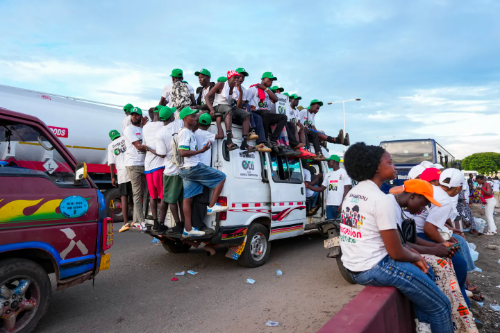Guinea Voters Back New Law Extending Presidential Term to Seven Years

TLDR
- Guineans have overwhelmingly voted in favor of a new constitution that extends presidential terms from five to seven years
- Provisional results from the Sept. 21 referendum showed 90.6% support for the draft, with 9.4% against, based on 91% of ballots counted
- The new charter clears a path for Doumbouya, who seized power in a 2021 coup, to stand for office after initially pledging a swift return to civilian rule
Guineans have overwhelmingly voted in favor of a new constitution that extends presidential terms from five to seven years and allows military leader General Mamadi Doumbouya to contest future elections.
Provisional results from the Sept. 21 referendum showed 90.6% support for the draft, with 9.4% against, based on 91% of ballots counted, election chief Djenabou Touré Camara said late Monday in Conakry.
The new charter clears a path for Doumbouya, who seized power in a 2021 coup, to stand for office after initially pledging a swift return to civilian rule. It also introduces stricter rules for political party participation.
Opposition leaders, including Cellou Dalein Diallo and former President Alpha Condé, boycotted the vote after their parties were suspended. International observers, including the UN rights office, have raised concerns about restrictions on political groups and media, questioning the credibility and inclusiveness of the process.
Daba is Africa's leading investment platform for private and public markets. Download here
Key Takeaways
The referendum reflects a broader regional trend of military-led governments consolidating power in West Africa. Guinea joins Mali, Niger, and Burkina Faso in rewriting political rules following coups in recent years. By extending presidential terms and lifting bans on military candidacies, the new constitution strengthens Doumbouya’s hold while reducing space for opposition parties, many of which have been suspended or silenced. Analysts say the high approval rate reflects both limited competition and a campaign dominated by state-backed “yes” rallies, while opponents were sidelined to social media. The outcome raises questions about Guinea’s democratic trajectory and the prospects for a genuine civilian transition. It also underscores shifting geopolitical alignments, as juntas across the region distance themselves from France and court closer ties with Russia. For international partners, the result signals continued uncertainty around Guinea’s political future and governance.

Next Frontier
Stay up to date on major news and events in African markets. Delivered weekly.
Pulse54
UDeep-dives into what’s old and new in Africa’s investment landscape. Delivered twice monthly.
Events
Sign up to stay informed about our regular webinars, product launches, and exhibitions.




